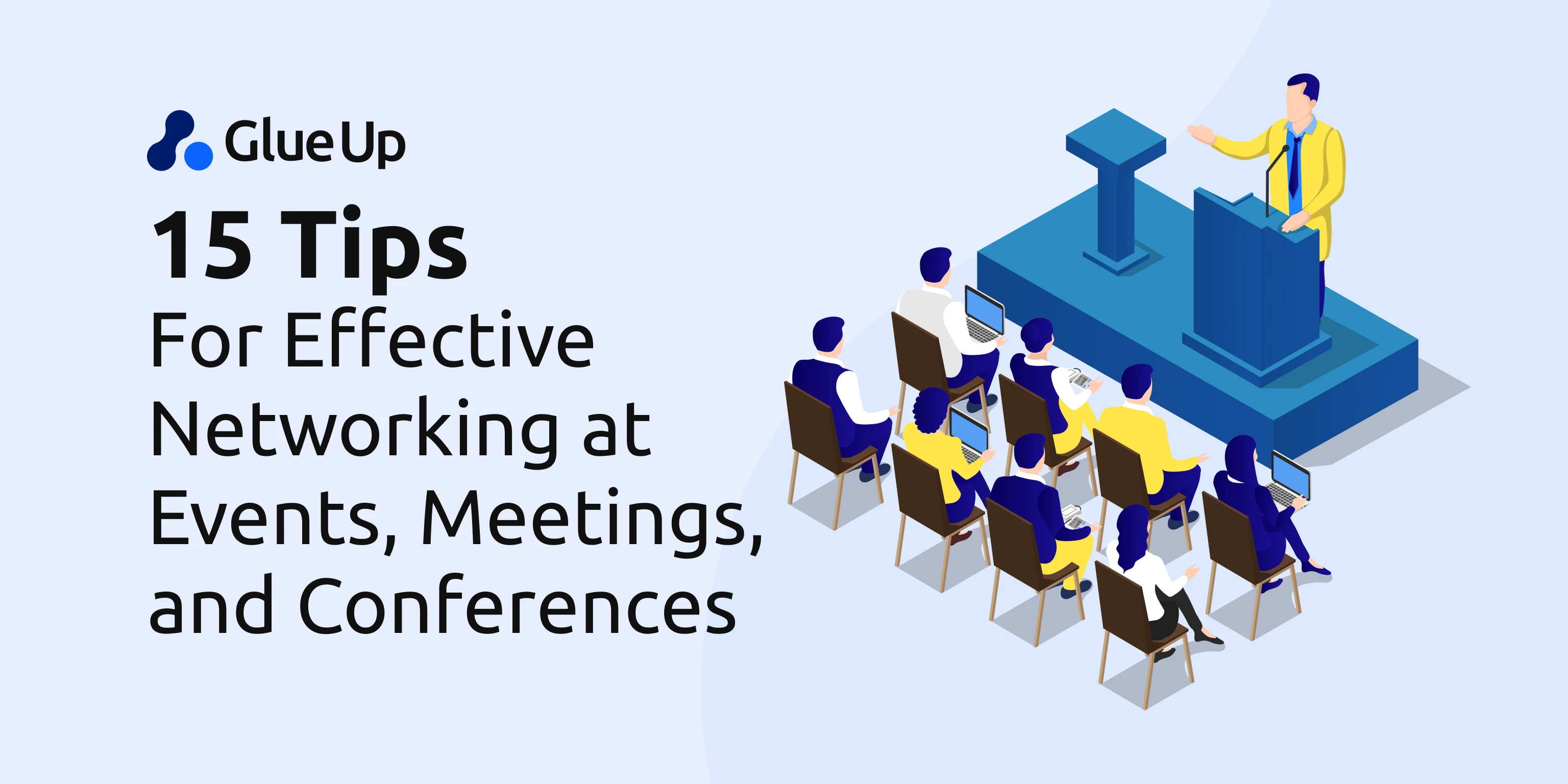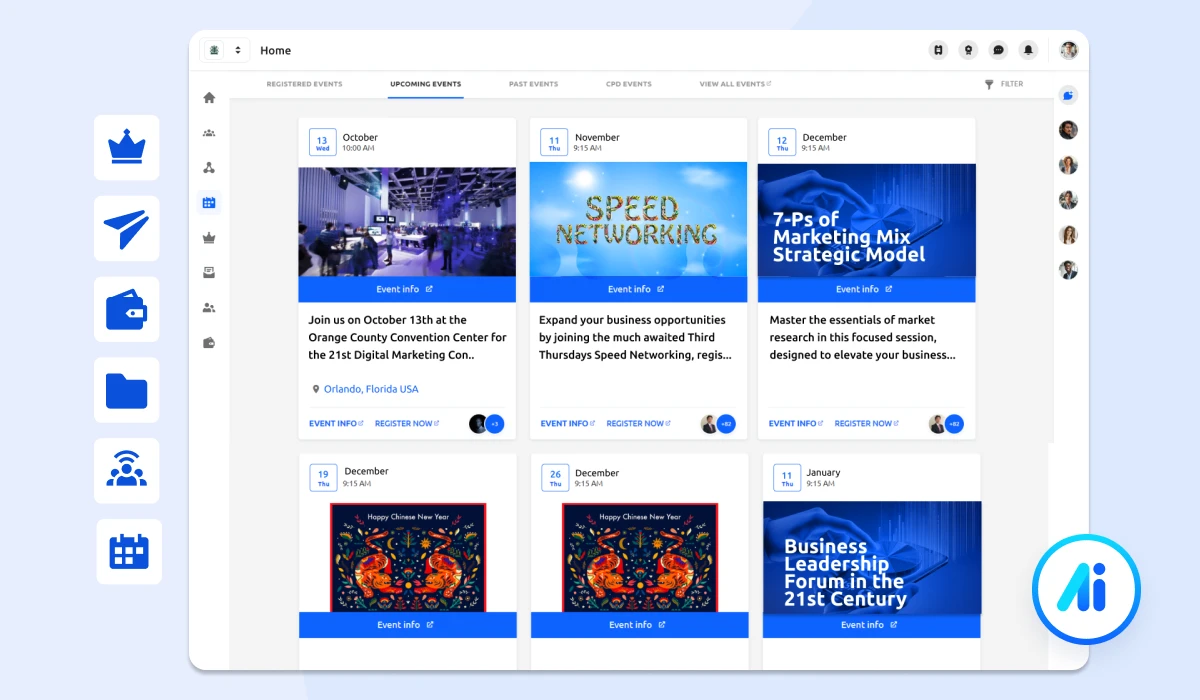
The foundation of networking (creating a network of contacts) is to find people who can help you develop your careers. Scientists have discovered that a larger social network helps career growth, gaining lucrative jobs, raising salary and overall job satisfaction. You do not have to be an influential person or the most open person in the world to communicate effectively with others.
Take a step forward. Start with people you know from work or social life and attend a networking event. Keep your ears tight and listen to information that can bring you an edge.
Key Takeaways
- Start with your current network, including schoolmates, colleagues, and family, as they can offer valuable connections.
- Engage in various networking events such as roundtables, breakfast meetings, and industry-specific gatherings to expand your network.
- Use digital tools like LinkedIn, networking apps, and online communities to connect with professionals and stay engaged.
- Follow up after events with personalized messages and maintain regular contact to nurture relationships.
- Glue Up offers event management software that streamlines networking efforts and manages connections effectively.
Scary Networking
Unless you're used to this idea, networking can make you horrified. You might think it's something for very self-confident types who get the best job anyway. But this is not the whole problem.
People are used to networking as a valuable business tool. The internet has made networking a viable option for everyone. There are lots of forums and business networking sites that allow business owners to share and discuss their opinions and knowledge.
Suppose you can reasonably separate your personal and professional online presence. In that case, it's a good way to get the latest news from your industry, but it can never fully replace meeting people in person.
What Are the Benefits of Networking?

Many good jobs will never get to recruiting firms, newspapers, or LinkedIn. They are shared by word of mouth. And the higher the position, the more likely it is that you will never find this job advertised anywhere. It's good to know someone in an organization that can help you get in. It can only end with an interview that is always less stressful.
Like other forms of social behavior, networking has some rules, too:
- The first impression matters - face to face, by phone, or by e-mail. Always try to be prominent.
- Do not ask directly for a favor - networking is not a trade fair; it's just a chance to get potentially useful information.
- Give and take - networking is a two-way exchange and not something that is free.
- Do your homework - learn about your contacts before you meet them, and maximize the opportunity.
- Think in context - try expanding your network by stepping out from your comfort zone or usual sphere of operation.
- Patience is a virtue - dedication to the networking is a marathon, not spring; do not expect to find a dream job or to close a deal after the first meeting.
We are all networking every day, even without realizing it. Networking is just purposeful, consistent socializing.
Creating Your Network
While you're new to the game, you might have a lot of valuable contacts you've never even though of before:
- old schoolmates from high school or college
- distant family members
- a family of your friends
- your doctor, lawyer or accountant
- former colleagues or superiors
- club members or anyone with whom you socialize
Building a network via events
Networking meetings and conferences are a good way to build a network if you are not sure where to start. Find out why you are and what you expect from it, and make sure you have a business card that you would pass on to important contacts you will meet. Here are the most common networking events:
Breakfast Networking Event
The majority of networking events takes place in the evening. Therefore for a morning person, breakfast networking is a great way to start your day. Breakfast meetings work especially well the morning before a long day of work and meetings. We have recently co-organized two CMO Breakfast networking events with American Chamber of Commerce.
Roundtable Events
Roundtable events give you an option to meet people in small groups. Roundtables allow for open forums and discussions that, more often than not, lead to creative ideas and new directions. It's a good opportunity to make new connections in the meantime and they provide open interaction.
Women/Men Organizations
Being involved in clubs and organizations specifically designed for women or men can help you to create a relationship with individuals who could be a great referral source.
Happy Hour Networking
Networking can be really stressful. Sipping a drink while mingling with people in a relaxing atmosphere is what makes Happy Hour networking events so popular.
Professional Associations
Professional association members tend to be from one specific type of industry. The main purpose is to exchange information and ideas. This is a simple procedure for targeting key groups. No matter what industry you are in, there are always people around to learn from. Take advantage of networking events in your area that hold events on a topic directly related to your working area.
Groups on social media
The digital age of networking is a blessing for the introvert in all of us. There are a ton of networking groups and forums on LinkedIn and Facebook (most major professional groups and their local chapters also have their own LinkedIn groups) that allow relationship-building (both business and personal) on a daily basis.

Following up after the event is also part of the networking.
Follow up after the networking event
Keep track of who you've met and what you've been talking about - it makes no sense to create a network of contacts that you'll forget. After the event send people you have met a“nice to meet you” message with a mention of a topic you have discussed with the person, so you remember the context of the conversation.
If the event you have attended has an event app for attendees, your job might be easier. Also keep in regular contact, even if you do not need anything specific at the moment. You do not want to be known as the person who only calls when in need.
Leveraging Technology for Networking
Leveraging technology refers to capitalizing on technological tools to improve networking efforts. Technology provides the edge to perform better and stand out, offering more useful ways to connect and engage. Consider the following strategies:
Engage on Professional Networks and Social Media
Actively participate on professional networks like Facebook and LinkedIn to connect with industry peers, join relevant groups, and engage in discussions.
Stats show that 61.4% of the global population uses social media, and 80.8% of audiences are aged 18+, which means more than half of the world's population is on these platforms, with a significant portion being adults.
There is a substantial opportunity to reach and engage with a wide audience. Sharing content, such as posts or articles, will showcase your expertise and attract like-minded professionals. This will help you expand your network and establish yourself as a thought leader in your field.
Attend Virtual Events and Utilize Networking Apps
Participate in webinars, online conferences, events, and virtual meetups to connect with industry leaders and peers without geographical limitations.
According to stats, 77.2% of people surveyed prefer virtual events because of their convenience, presenting a significant opportunity to engage with and convert a large audience.
Networking apps like Shapr or Meetup can help you discover and connect with professionals in your field, providing opportunities to join events and groups that align with your interests.
Take Benefit of Video Conferencing and Online Communities
Use platforms like Zoom or Microsoft Teams to schedule virtual meetings with colleagues, clients, or mentors. Join online communities and professional groups related to your industry to engage in discussions, share insights, and build new relationships. These activities help maintain existing connections and build new ones.
Automate Follow-Ups and Relationship Management
Use CRM tools or email automation software to manage and nurture your professional relationships. Automating follow-ups allows you to stay in touch with important connections, making it easier to maintain and grow your network over time.
Crafting Your Networking Strategy

Crafting a powerful networking strategy involves careful planning and active engagement. Here's how you can do it:
Identify Your Networking Goals
Start by defining what you want to achieve through networking. Whether it’s finding new members, building industry connections, or gaining knowledge, having clear goals will guide your approach and help you measure success.
Build and Maintain Relationships

Engage regularly with your network to build and maintain relationships. Attend events, both virtual and in-person, where you can meet new people and reconnect with existing contacts. Use social media platforms like Facebook, Twitter, and LinkedIn to stay in touch and share valuable content that resonates with your network.
Regular follow-ups and meaningful interactions are key to sustaining these relationships over time.
Engaging in Meaningful Conversations
Engaging in meaningful conversations is very important for effective networking. Focus on genuine interactions that go beyond superficial exchanges. Show interest in others by asking thoughtful questions, listening actively, and offering insights or assistance where you can.
Building trust through these authentic connections makes your networking efforts more impactful and promotes long-lasting relationships.
Navigating Networking Etiquette
Navigating networking etiquette involves understanding and practicing professional norms that inspire positive interactions. Start by introducing yourself clearly and confidently. Be genuinely interested in others’ work and perspectives. Respect others' time by being concise and focused during conversations.
Follow up promptly after initial meetings with a personalized message or thank you note. Additionally, be mindful of cultural differences and adjust your approach accordingly to ensure respectful and effective communication.
Measuring Networking Success
Measuring networking success involves analyzing the effectiveness of your networking activities. Start by tracking the number of new connections made and the quality of these relationships.
Assess the impact on your professional goals, such as opportunities gained, collaborations initiated, or referrals received. Networking helps fill 85% of positions, so if your networking efforts are effective, you should see results approaching this figure. Monitor the growth of your network and engagement levels in follow-up interactions.
Additionally, gather feedback from contacts to understand how your networking approach is perceived and identify areas for improvement. Regularly reviewing these metrics will help you refine your strategy and achieve better results.

Are you or your organization running events? We have a solution for you. Learn about our event management software by booking a demo!



